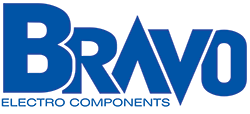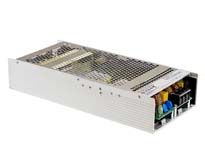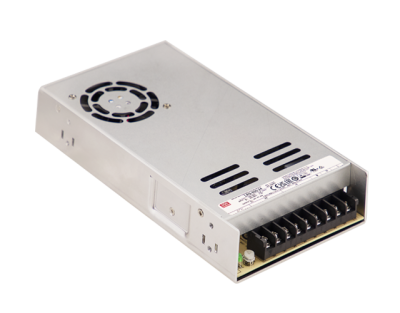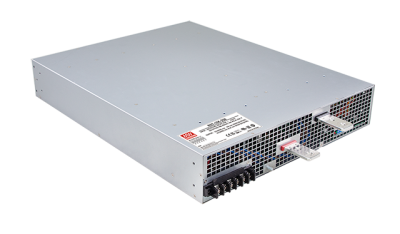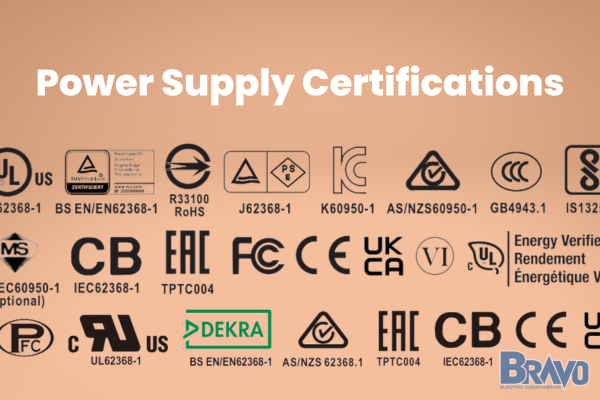
Whether you are replacing a power supply at the end of its lifespan or looking to improve the efficiency of your facility, learning the ins and outs of power supply certification ratings is crucial for the safety of your business operations.
Several regulatory agencies have created certified power supply ratings to protect your device from fires and electrical hazards. It’s easy to get overwhelmed, though, between IEC, ISO, UL, CE, DIN, and more.
There is a lot to learn in the world of PSU certifications, and the power supply certification symbols can be tricky to decipher at face value. That’s why we’ve combined our two decades of experience with the help of our engineering teams to create this chart to simplify things:
| Certification | Purpose | Applications | Region |
|---|---|---|---|
| IEC 60601-1 | Ensures electrical safety of medical power supplies, preventing electrical shock and hazards. | Medical devices, hospital equipment, life-support systems. | Global |
| IEC 62368-1 | Safety standard for power supplies in IT and audiovisual applications. | Servers, networking equipment, telecom systems. | Global |
| UL 508 | Certifies safe operation of industrial control equipment power supplies. | Factory automation, PLCs, control panels. | USA |
| UL 60950-1 | Safety standard for information technology equipment power supplies. | Computers, data centers, telecom power supplies. | USA |
| UL 8750 | Safety standard for LED drivers and lighting power supplies. | LED lighting systems, commercial lighting, display signage. | USA |
| CE Marking | Indicates compliance with European safety, health, and environmental standards. | All electronic power supplies sold in the EU. | European Union |
| RoHS | Restricts hazardous substances (lead, mercury, cadmium, etc.) in power supplies. | All consumer and industrial power supplies. | Global |
| Energy Star | Ensures energy efficiency for reduced power consumption and heat generation. | Consumer electronics, office equipment, home appliances. | USA |
| DIN 61558-2-16 | Specifies safety requirements for transformers and power supply components. | DIN rail power supplies, industrial automation, control systems. | Germany |
| TUV Rheinland | Certifies compliance with German safety and quality regulations. | Industrial power supplies, medical equipment, high-voltage applications. | Germany |
But if you’re shopping for AC DC power supplies or a DC converter, you can simply reach out to our team at Bravo Electro and we’ll discuss the details of your application so we can provide accurate recommendations of what certifications matter most. Don’t hesitate to reach out!
What is a Power Supply Certification?
PSU certifications are a set of guidelines backed by rigorous testing and standards that guarantee the safety and efficiency of your devices. These standards apply across industries and types of power supplies, from modular power supplies for hospitals to class 2 power supplies for enterprise use.
It gives businesses and manufacturers a consistent way to gauge the effectiveness of power supply units. Certifications are backed by a series of tests, including voltage testing, overload testing, efficiency testing, and, most importantly, safety testing.
These tests often use standards established by government regulatory agencies to maximize safety and energy efficiency. One specific agency is The International Electrotechnical Commission (IEC).
This international body develops safety standards for electrical components and power supplies to ensure electrical equipment is safe and does not pose a risk of electrical shock or fire. It comprises 89 member countries and works closely with the International Standards Organization (ISO).
Many of the IEC’s standards, like IEC 60950-1 and IEC 60601-1, are the baseline on which regional agencies like UL, CE, and DIN base their certifications.
But, the specific power supply certifications needed in a medical setting differ dramatically from those in a manufacturing facility. So let’s get into the most common certifications below.
Common Power Supply Certifications
With so many power supply certifications and agencies out there, we’ll need to break things down into categories to help explain the most common regulations. You may find overlap in certain regulatory standards depending on the exact use case you are shopping for.
DIN Rail Power Supply Certifications
DIN is Germany’s national standards agency. While DIN provides a set of power supply certification standards, a “DIN Rail” is a specific type of product with several ratings from various regulatory agencies.
DIN Rails are used to mount industrial equipment, especially during automation processes. There are a few important certifications to watch out for.
- UL 508 certifies that DIN Rail power supplies can function safely with industrial control equipment.
- IEC 61558-2-16 certifies that a power supply is suitable as a transformer
- IEC 6100-6-2 provides a set of standards that proves a power supply meets electromagnetic compatibility requirements for DIN Rails and industrial settings.
Industrial Power Supply Certifications
DIN Rails are not the only industrial applications with necessary power supply certifications. Industrial power supply units of any type should be built for stable, reliable power delivery even in harsh environments. Power supplies in manufacturing or process control settings need the following PSU certifications:
- UL 508 provides an overarching set of standards for all industrial equipment.
- UL 60079 is an important safety certification that ensures electrical equipment can operate safely in environments with explosive materials, including gas or combustible dust.
Medical Power Supply Certifications
Medical grade power supplies are built with exacting performance standards and safety in mind since the stakes are much higher than in other industries. These power supplies can power everything from monitoring systems to medical imaging devices. Power supply certifications to search for are:
- IEC 60601-1 certifies that power supplies meet safety requirements for electrical medical equipment.
- IEC 60601-1-2, a subsection of the same standard, was added to supplement the standard with electromagnetic compatibility requirements.
- UL 60601-1 speaks to standards for safety certification for medical devices.
- UL 60950-1 ensures information technology devices meet safety requirements in medical settings.
LED Driver Certifications
LED drivers provide regulated power to LED lighting systems, and the risk of fire and shock are high in certain applications. You may need the following certifications:
- IEC 61347-1 certifies that a driver meets safety requirements for electronic control gear for your LED modules.
- IEC 61347-2-13 ensures drivers are capable of working with LED modules and arrays under the same safety standards.
- UL 8750 judges drivers under similar standards as IEC 61347-1, ensuring your power supply is safe for use with the rest of your LED equipment.
There are several different types of LED drivers out there, and we recommend reaching out to our team at Bravo Electro for a personalized recommendation. We have many LED drivers for sale, all backed by IEC safety standards.
Adapters or External Power Supply Certifications
Adapters are designed to power many different types of devices. As such, safety standards must guarantee that power supplies are safe to use across the board.
- IEC 60950-1 is the most prevalent listing, providing safety requirements for all manner of technology and equipment. You may find similar 60950-1 standards from UL and DIN in the USA and Germany, respectively.
- IEC 62368-1 guarantees power supplies meet audio, video, or IT equipment standards.
Looking for those standards is an excellent start to ensure you purchase the right power supplies for your business. Computer power supplies have their own set of standards, so let’s briefly touch on those below.
Computer Power Supply Certification Levels
The gold standard (or, in this case, titanium standard) for PSU certifications was created by Ecos Consulting by way of EPRI, or Electric Power Research, in 2004. They dubbed this system “80 Plus” as a way to certify PSUs that are at least 80% efficient at 20%, 50%, and 100% loads.
The efficiency ratings of the 80 Plus system will vary slightly based on your power supply voltage, so we are using a 115-voltage unit as an example for each tier. High voltage power supplies are often more efficient, so keep that in mind while shopping for the best results!
80 Plus’ computer PSU rating system comprises five tiers denoted by different rare metals. Here is a look at what each tier offers:
- Bronze: This entry-level certification still packs a punch, with a minimum of 80% efficiency at 20% and 100% loads.
- Silver: Silver-rated PSUs operate at 85% efficiency at 20% and 100% loads, making them an excellent choice for desktops, workstations, and small servers.
- Gold: These PSUs offer 87% efficiency at 20% and 100% loads. They are prevalent in high-range desktops and servers, along with research labs.
- Platinum: With a whopping 90% efficiency at 20% and 100% loads, platinum-rated PSUs are powerhouses perfect for data centers, research labs, and medical imaging.
- Titanium: As the best-rated computer PSUs, titanium-rated devices push the limits of thermodynamics to deliver up to 94% energy efficiency at 50% load. They are common in large enterprises, including data farms, research labs, and medical facilities.
Computer power supply certifications are not our specialty here at Bravo Electro, as we sell exclusively industrial PSUs. But, no conversation on PSU certifications could be complete without mentioning 80 Plus! That being said, let’s look at some other regulatory boards below:
The Role of Regulatory Standards in Power Supply Certification
Power supply certification ratings are paired with regulatory standards so you can accurately assess a PSU’s qualities before purchase. Otherwise, you’d have no way to discern between different PSU certifications.
Regulatory standards provide consistent guidelines spanning various jurisdictions and countries so electrical engineers and businesses alike can enjoy consistency and efficiency during custom power supply design or the setup of an electric network. Watch out for these names and symbols:
- DIN stands for the Deutsches Institut für Normung, the German national standardization agency. They are a member of the ISO, helping to contribute to IEC standards.
- TUV Rhineland is a technology agency based out of Germany which also provides certifications for power supply devices according to DIN standards.
- UL stands for Underwriters Laboratories, a safety certification organization based in the United States. UL listed power supplies have a long track record of product certification, and many jurisdictions require the UL rating before a product is marked for sale.
- Underwriter’s Laboratories also provides ratings under “UL Recognized” for products containing UL-rated power supplies. You may also find “UL Canada” devices for the equivalent Canadian subsidiary.
- Canadian Standards Association (CSA) works with UL to denote products acceptable under Canadian safety regulations.
- CE is the European Union’s safety certification marking, which has existed for over 30 years. Among other safety features, their standards include the low voltage directive, which prevents devices from exceeding 1000 volts in either AC or DC power.
- RoHS is another EU directive, the Restriction of Hazardous Substances. This standard ensures dangerous materials are not present in your power supplies, making this a must-have for every purchase.
- The US commonly uses the FCC to regulate media, but power supplies also fall under their jurisdiction. The FCC seal of approval ensures PSUs do not emit excess electromagnetic or radio frequency interference. This is crucial for medical facilities and data centers.
- The United States Environmental Protection Agency runs Energy Star, which judges and guides energy efficiency. While their standard is not required for a product to be sold, purchasing a product backed by Energy Star can help you save money and help the environment.
Certification and regulatory standards go hand-in-hand. Many certification agencies, like the 80 Plus system, require regulatory compliance as part of their rating system.
This includes safety considerations, which are covered by UL, DIN, and CE, along with environmental concerns that Energy Star and RoHS watch over. The best power supply brands manufacture their products within these guidelines, as failure to do so would strip them of their certifications.
How to Check Power Supply Certification Symbols Yourself
There are so many symbols and markings on power supplies that it may seem like you are reading hieroglyphics at first. Thankfully, these regulatory agencies have made it simple to verify their markings once you know what to look for.
Symbols are often located in a prominent location near the outlet of the device. They’re also prominently displayed on product pages and manuals. Or, verify regulatory compliance by consulting with agency websites or resources.
The logos and symbols on power supplies are relatively straightforward:
- UL power supplies feature a logo with the letters “UL” and you can usually find a serial number paired with it. You may also find “UR” symbols to represent UL-Recognized products.
- CSA’s products are denoted by a Large “C” with a smaller “SA” inside. You may also find a smaller “US” written next to the logo for products approved for US and Canadian sales.
- CE-rated supplies feature a stylized “C E” logo and a four-digit identifying number.
- DIN is one part of TUV Rhineland’s safety standards. You can identify these products by a logo featuring the three letters “DIN” between two parallel lines.
- 80 Plus uses five different logos color-coded for your convenience. Look for a rectangle logo with 80 PLUS, along with additional text describing which level the PSU fits into.
- RoHS compliance is denoted by logos featuring the four-letter acronym. They are often stylized with a checkmark or a leaf and carry a serial number.
- Energy Star’s logo is cursive, with a stylized star and additional text.
Double-checking the certification on your power supply guarantees you’re getting a safe product. It’s the only way to ensure the safety of your employees, customers, patients, and overall business operations.
Unfortunately, low-quality manufacturers will skew numbers and tests to try to meet guidelines set by regulatory agencies. This can expose you to bad power supply symptoms or exorbitant energy bills down the line.
That’s why you should only purchase from a verifiable dealer/manufacturer with a strong track record of reliability. Look no further than Bravo Electro.
Find the Perfect Certified Power Supply For Your Operation at Bravo Electro
From AC DC power supplies to fans, there is no better place to shop for electrical components than Bravo Electro. We only carry power supplies compliant with every major certification agency so you receive a safe and efficient device that will stand the test of time.
Our on-site California-based engineers are always available to talk shop and help you find the perfect choice for your organization. We even offer customized power supply designs.
Our DC power supplies pass certification tests with flying colors. We have 12 volt DC power supplies for small applications, 24 volt DC power supplies, and 48 volt DC power supplies for data centers and other large systems.
Our DIN rail power supply inventory is perfect for industrial settings, with overvoltage and short-circuit protection that will provide durability and peace of mind. We also have modular power supplies for flexibility and we carry both enclosed power supplies and open frame power supplies.
We recommend hopping on a call with our award-winning customer support team for a personalized recommendation. Get in touch today to take the guesswork out of power supply certifications!
Bringing Our Conversation on PSU Certifications to a Close
Shopping for new power supply devices for your business or facility can be a journey fraught with confusing symbols, dubious products, and safety risks. Thankfully, buying a certified PSU from Bravo Electro takes the stress out of the process.
The only way to guarantee a hazard-free experience and efficiency throughout a power supply lifespan is to look for power supplies backed by regulatory agencies like IEC, UL, CE, and DIN. From power supply efficiency ratings to other power supply specifications and power supply safety standards, we hope you feel confident in your next steps.
But we love helping organizations and businesses find the perfect power supplies for their needs and have trained our customer support team on technical knowledge. So if you’re ready to streamline the power supply shopping process, get in touch for a personalized recommendation today!
